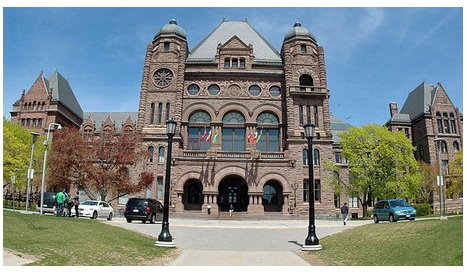Six Nations Polytechnic Aboriginal Institute to Offer Standalone Languages Degree Program
Ontario Helping to Expand Post-secondary Options for Indigenous Students
| NEWS | February 8, 2016 |
Ontario is helping to improve access to culturally appropriate postsecondary education and training opportunities for Indigenous learners by making it possible for Six Nations Polytechnic, an Aboriginal Institute, to offer a standalone degree program.
For the first time, the province will make it possible for an Aboriginal Institute, an organization that is run and governed by Indigenous communities, to offer a standalone degree program. As of January 2016, students at Six Nations Polytechnic Aboriginal Institute in Ohsweken can obtain a Bachelor of Arts degree in Ogwehoweh (Cayuga and Mohawk) Languages.
This degree will help promote and protect Ogwehoweh languages and make it possible for students to complete their degree at one institution, closer to home. It also will help students build on their linguistic skills and cultural knowledge as well as expand their opportunities to participate in the labour market. This standalone degree also supports the recommendations of the Truth and Reconciliation Commission, which called for postsecondary institutions to create degree programs in Indigenous languages.
Investing in the talent and skills of First Nation, Métis, and Inuit learners is one of many steps on Ontario’s journey of healing and reconciliation with Indigenous peoples. It reflects the government’s commitment to work with Indigenous partners, creating a better future for everyone in the province.
QUOTES
“Our government has made a clear commitment to learn from the past, build on our success stories, and increase our efforts to help Indigenous learners get the education and training they need. Six Nations Polytechnic is committed to creating an Indigenous environment that is grounded in culture and community, language, research, and academic quality, and this new degree program will help improve Indigenous learners’ access to, participation in, and completion of postsecondary education and training programs in Ontario.”
— Reza Moridi, Minister of Training Colleges and Universities
“I want to thank Six Nations Polytechnic for the leadership and guidance they have provided. Today’s announcement provides a tangible illustration of Ontario’s journey along the path of reconciliation. We will continue to rely on Indigenous partners as we chart a way forward that will produce tangible results.”
— David Zimmer, Minister of Aboriginal Affairs
“Language preservation and protection are at the core values of Six Nations Polytechnic. That’s why we have always had the intention of having our Ogwehoweh Language Diploma Program become a language degree program.”
— Rebecca Jamieson, President Six Nations Polytechnic
“Congratulations to Rebecca and her entire team. They have worked tirelessly to bring about the expansion of Six Nations Polytechnic programming. Education is the cornerstone of the future successes of our local Indigenous students.”
— Dave Levac, Member of Provincial Parliament, Brant
QUICK FACTS
- Aboriginal Institutes provide opportunities for students to start and complete postsecondary education credentials in a culturally appropriate and safe learning environments close to home and are completely run and governed by Indigenous communities.
- The Ogwehoweh (Cayuga and Mohawk) Languages degree builds on the strong foundation of the current language diploma program offered in partnership with McMaster University.
- Six Nations Polytechnic is an Aboriginal postsecondary education and training institute located in Ohsweken, a community on Six Nations of the Grand River Territory near Brantford, Ontario.
- Six Nations Polytechnic applied for and was granted consent to offer a Bachelor of Arts degree in Ogwehoweh (Cayuga and Mohawk) Languages.
- Ontario provides $1.5 million in annual funding through the Aboriginal Student Bursary Fund to help Indigenous learners with financial needs participate in postsecondary education and training.
- In June 2015 the province committed stable funding of Indigenous postsecondary education totaling $97 million over three years, including an additional $5 million to support the sustainability of Ontario’s nine Indigenous-owned and operated postsecondary education and training institutes located throughout the province. In 2013-14, about 16,036 self-identified Indigenous learners attended college and university in Ontario, an increase of about nine per cent or 1,472 learners since 2009-10.
LEARN MORE
Aboriginal Postsecondary Education and Training Bursary
Aboriginal Postsecondary Education and Training Policy Framework
| Belinda Bien, Minister’s Office, 647-823-5489
Tanya Blazina, Communications Branch, 416-325-2746 Public inquiries, 416-325-2929 or 1-800-387-5514 TTY 1-800-268-7095 |
ontario.ca/tcu-news
Disponible en français |
Offre d’un programme indépendant menant à un diplôme à l’institut autochtone Six Nations Polytechnic
L’Ontario contribue à accroître les options d’études postsecondaires des étudiants autochtones
| NOUVELLES | Le 8 février 2016 |
L’Ontario contribue à améliorer l’accès des apprenantes et apprenants autochtones à des possibilités de formation et à des études postsecondaires adaptées à leur culture en permettant à la Six Nations Polytechnic, un institut autochtone, d’offrir un programme d’études indépendant menant à un diplôme.
Pour la première fois, la province accepte qu’un institut autochtone offre un tel programme d’études indépendant. Les instituts autochtones sont des établissements exploités et gérés par des communautés autochtones. À compter de janvier 2016, les étudiants de la Six Nations Polytechnic peuvent recevoir un baccalauréat ès arts dans les langues ogwehoweh (cayuga et mohawk).
Ce baccalauréat contribuera à promouvoir l’usage des langues ogwehoweh et à les protéger. Il permettra également aux étudiants de faire leurs études dans un seul établissement, plus près de chez eux. Ils pourront approfondir leurs compétences linguistiques et leurs connaissances culturelles, en s’ouvrant à davantage de possibilités d’intégrer le marché du travail. En outre, l’offre de ce programme indépendant menant à un diplôme répond à la recommandation de la Commission de vérité et réconciliation voulant que les établissements d’enseignement postsecondaire créent des programmes d’études en langues autochtones.
Investir dans le talent et les compétences des apprenantes et apprenants métis, inuits et des Premières Nations constitue l’une des nombreuses étapes que l’Ontario devra franchir tout au long du processus de guérison et de réconciliation. Cela reflète aussi l’engagement du gouvernement à collaborer avec ses partenaires autochtones et à bâtir un avenir meilleur pour tous les habitants de la province.
CITATIONS
« Il est indéniable que le gouvernement s’est engagé à tirer des leçons du passé, à amplifier ses réussites et à redoubler d’efforts pour aider les apprenants autochtones à entreprendre les études et la formation dont ils ont besoin. La Six Nations Polytechnic s’engage à créer un environnement propice à l’apprentissage des autochtones dont les fondements sont la culture, la communauté, la langue, la recherche et la qualité des programmes. Ce nouveau baccalauréat améliorera l’accès à l’éducation postsecondaire des apprenants autochtones en Ontario et contribuera à l’accroissement du nombre d’étudiants autochtones détenteurs d’accréditations ou de diplômes. »
— Reza Moridi, ministre de la Formation et des Collèges et Universités
« Je souhaite remercier la Six Nations Polytechnic pour le leadership dont elle a fait preuve et pour l’orientation qu’elle a su donner. L’annonce d’aujourd’hui illustre parfaitement le processus de réconciliation entrepris par l’Ontario et nous continuerons de collaborer avec nos partenaires autochtones en vue d’arriver à des résultats concrets. »
— David Zimmer, ministre des Affaires autochtones
« La préservation des langues autochtones est au cœur des valeurs de la Six Nations Polytechnic. C’est d’ailleurs pourquoi nous voulions depuis longtemps que notre programme en langues Ogwehoweh mène à un grade universitaire. »
— Rebecca Jamieson, rectrice, Six Nations Polytechnic
« Toutes mes félicitations à Rebecca Jamieson et à son équipe. En effet, la diversification des programmes offerts à la Six Nations Polytechnic est un travail de longue haleine. Nous savons que l’éducation est la pierre angulaire sur laquelle repose le succès des étudiants autochtones de la région. »
— Dave Levac, député provincial de Brant
FAITS EN BREF
- Grâce aux instituts autochtones, les étudiants peuvent commencer et terminer leur éducation postsecondaire dans un milieu d’apprentissage près de chez eux qui est à la fois sécuritaire et culturellement adapté. Les instituts autochtones sont exploités et gérés par des communautés autochtones.
- Le programme d’études en langues ogwehoweh (cayuga et mohawk) a comme base solide le programme de langues qui est actuellement offert en partenariat avec l’Université McMaster.
- La Six Nations Polytechnic est un institut d’enseignement postsecondaire et de formation autochtone situé à Ohsweken, dans le territoire des Six Nations de la rivière Grand, près de Brantford, en Ontario.
- La Six Nations Polytechnic a reçu l’autorisation d’offrir un programme de baccalauréat ès arts en langues ogwehoweh (cayuga et mohawk).
- L’Ontario octroie 1,5 million de dollars par an par l’entremise du Fonds des bourses pour les étudiantes et étudiants autochtones. Ce fonds aide les apprenants autochtones ayant des besoins financiers à accéder à la formation ou aux études postsecondaires.
- En juin 2015, la province a pris l’engagement de fournir un financement stable de 97 millions de dollars sur trois ans pour appuyer l’éducation postsecondaire des Autochtones. Cet investissement comprend un financement supplémentaire de 5 millions de dollars consacrés à la viabilité des neuf instituts d’enseignement et de formation postsecondaires de l’Ontario exploités et gérés par des communautés autochtones. En 2013‑2014, environ 16 036 apprenants auto-identifiés comme Autochtones ont fréquenté un collège ou une université en Ontario, ce qui représente une augmentation d’environ 9 %, ou de 1 472 personnes, depuis 2009‑2010.
POUR EN SAVOIR DAVANTAGE
Bourses pour l’éducation postsecondaire et la formation autochtones
Cadre d’élaboration des politiques en matière d’éducation postsecondaire et de formation autochtones





